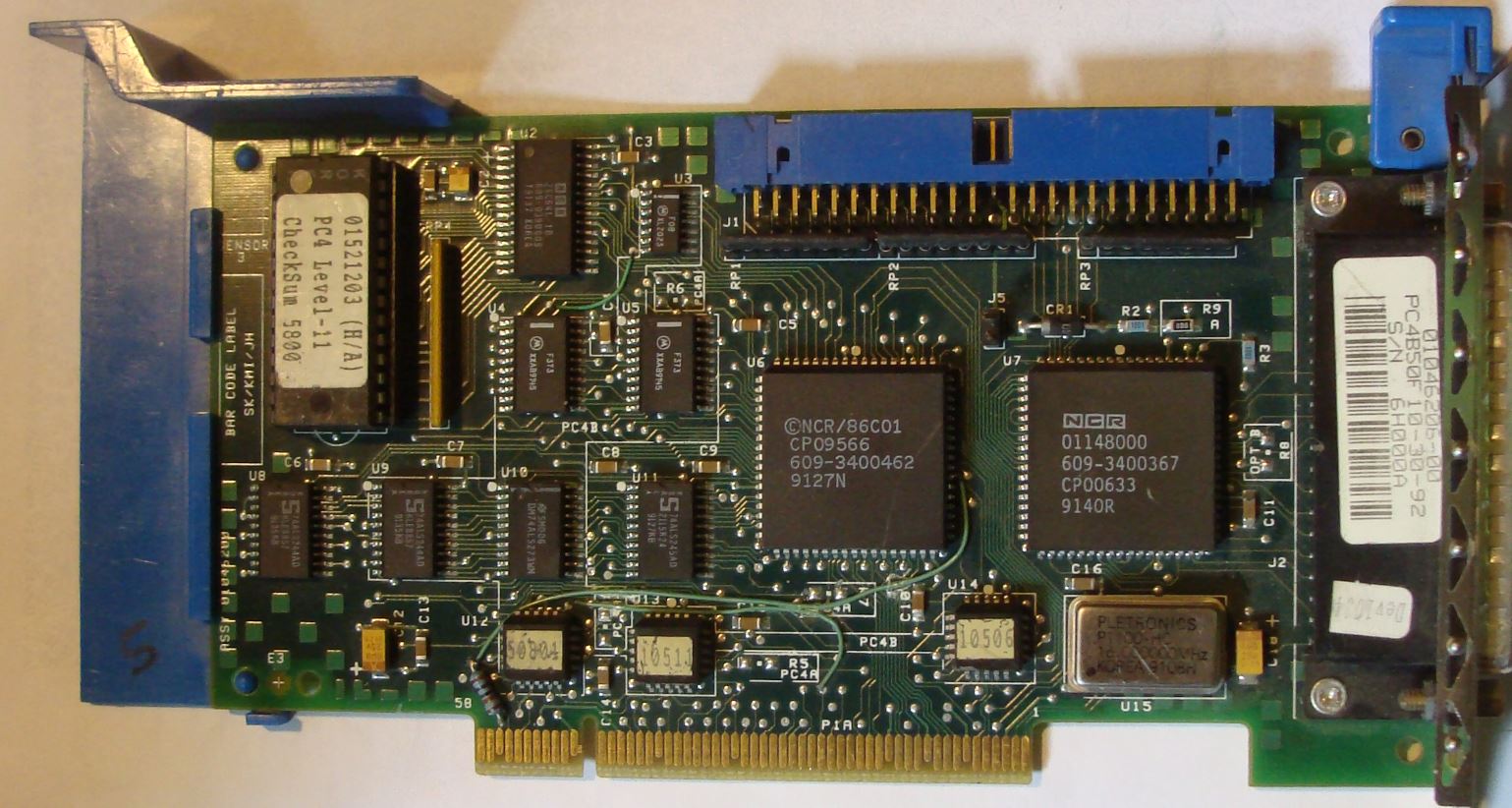|
@7FF9.ADF - IOMEGA PC4 Host Adapter Board @7FFA.ADF - IOMEGA PC4B/50 SCSI Host Adapter Board @5FCB.ADF - IOMEGA PC4B/HD SCSI Host Adapter Board iomega-pc4b50-v6.21-rom.bin PC4B/50 ROM Requires 27C64A-25 [thx to Alex Perez] NOTE: I lack any images of a PC4B/HD 5000 – 5FFF Direct Memory Access (DMA) Devices 7000 – 7FFF Storage *Multi-function adapters with storage typically respond as storage IOMEGA turned over support for Bernoulli and Floptical products to Comet Enterprises Bernoulli drivers ioware9xdrv.exe Win 95/98 ver 1.0 iowarentdrv.exe Win NT 3.51 / 4.0 ver 1.0 dosdrvr.exe Win 3.1 / DOS ver 1.0 OS2V234.EXE Iomega Tools for
OS/2 DOS, All 5 1/4 Bernoulli drivers 8" drives, DOS, drivers ("Alpha") Floptical ? FTP Iomega
Software FTP [It's dead, Jim] PC4B/HD [ADF only :( ] PC4 BD#2 0068300-0 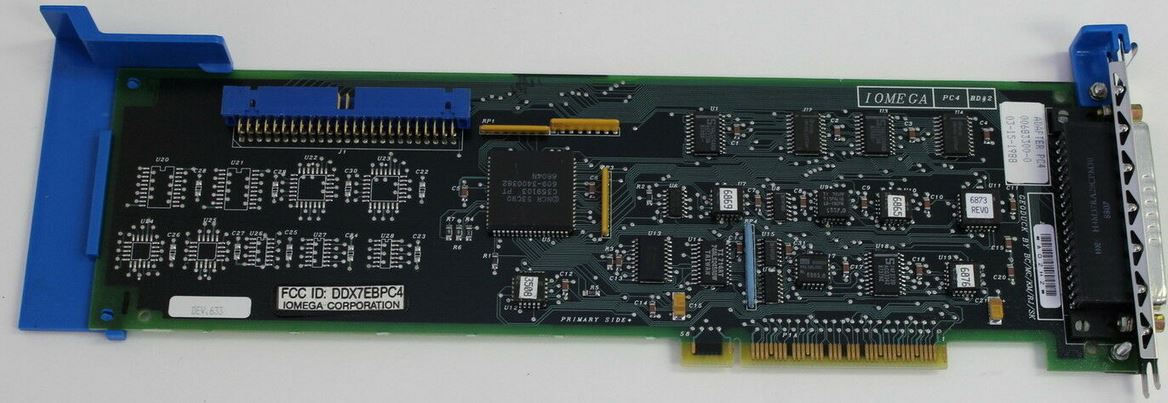 Full length, 16-bit card, left third has a buncha non populated positions. Uses NCR 53C90 Was there a PC4 "BD#1" which used an NCR 5390? The 5390 to the best I can determine lacked DMA. Period articles [the very few] say the PC4 does not do DMA. No BIOS chip, GAL / PAL? Three soldered Resistor networks. No apparent jumpers. 50 pin shrouded internal header, DB37 external header. My SWAG, the PC4B used a variant of 53C90 ? Silkscreen upper right, "IOMEGA PC4 BD#2 Silkscreen by barcode: Geoduck by BC/MC/KM/RJ/SK Adapter PC4 0068300-0 03-15-1988 FCCID: DDX7EBPC4 ADF Sections 07FF9h "IOMEGA PC4 Host Adapter Board" NumBytes 2 "I/O Address Select" Use any one of the I/O Addresses listed. 'Disabled' causes the adapter to be inaccessible. "240" [00240-0025F], 340 [00340-0035F], 400 [00400-0041F], 420 [00420-0043F], 3240 [03240-0325F], 8240 [08240-0825F], A240 [0A240-0A25F], "Disabled" "DMA Level Select" The PC4 supports the DMA mode of data transfer. The lower the DMA level, the higher the priority. DMA level 5 is recommended. "DMA Level 5", 6, 7 "Fairness" 'Fairness' enabled, the PC4 won’t compete for the channel during the next arbitration phase if it is currently in control of the channel. Other installed adapters can obtain the channel in the next sequence based on each adapter's assigned priority level. 'Fairness' disabled, the adapter competes for every arbitration phase and obtains more than its fair share of channel usage. Recommend 'Fairness Enabled' for all adapters. "Fairness Enabled", "Fairness Disabled" "Preempt Count Select" When the PC4 detects that another adapter requires use of the channel, the Preempt Count feature is activated. The Preempt Count is the maximum number of bytes to transfer before yielding control of the channel. The PC4 always transfers a max of 7 bytes before relinquishing control of the channel. NOTE: Always ON, it appears... "7 Bytes" NOTE: The little bit we have on the NCR 8601 has four settings, 0, 1, 3, and 7. PC4, PC4A, PC4B, What's the Difference? Originally, "B" suffix interfaces had the BIOS ROM. The PC4 has no ability to take a BIOS. PC2, PC3, PC4 had no BIOS. When the PC4B was created, IOMEGA must of had considered how to differentiate between the more primitive PC4 and the more advanced PC4B. My SWAG, you see the silkscreen outline that says PC4B? It encircles the BIOS support chips. Components marked "A" or "PC4A" were most likely to provide electrical continuity for a non-BIOS configuration. PC4B/50 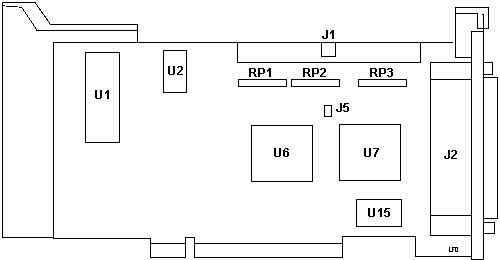
Image from Alex Perez 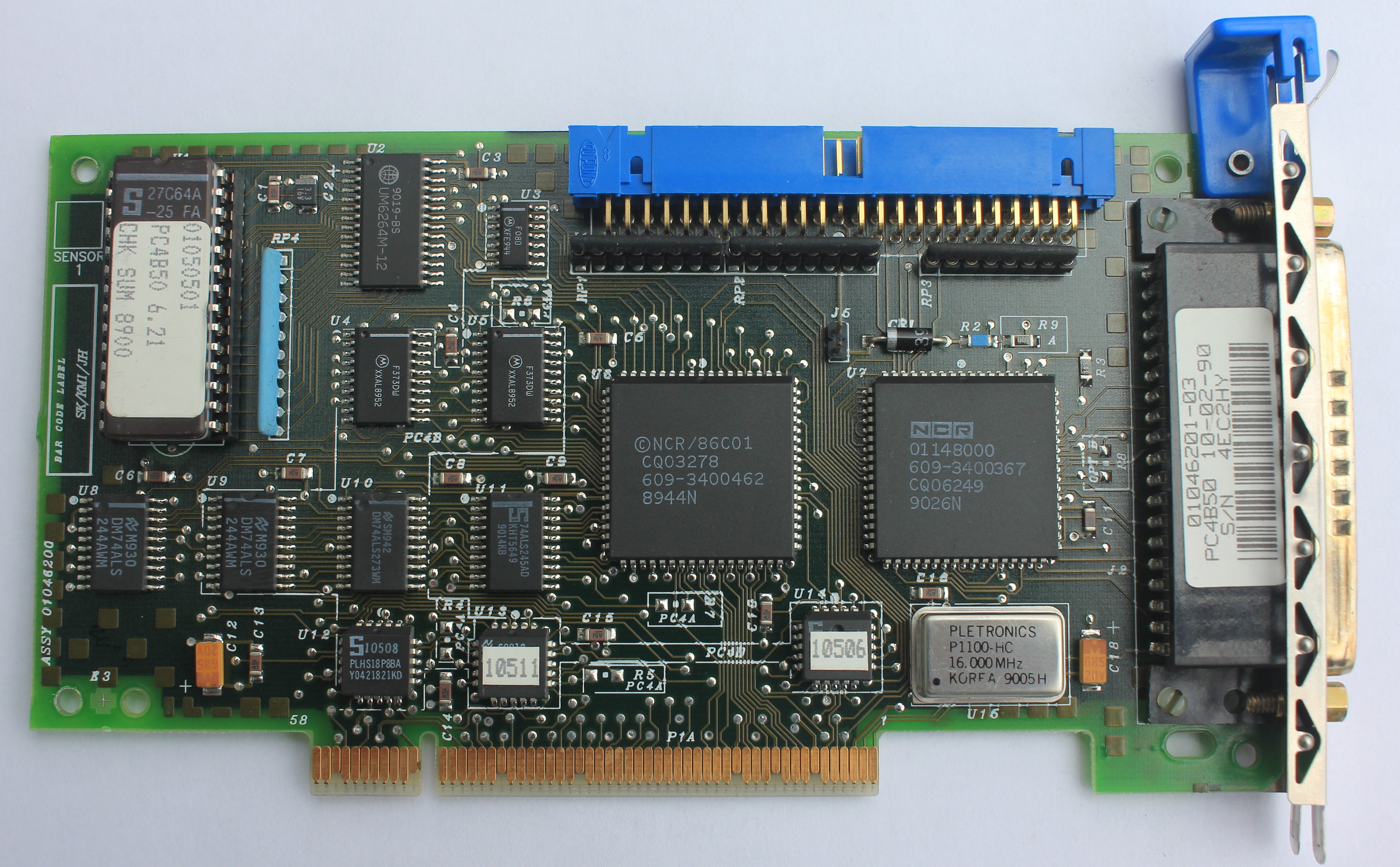 Notice the outlines marked "PC4A" and "PC4B" ? I've seen this on the BusLogic BT-646 S/D, where the SE version and the Differential version populate the call-outs as required... J5 and CR1 provide TERMPWR. "Bar Code Label" SK/KMI/JH "JH" like Jack Hoa from Future Domain? IOMEGA identifies the card quite well on the sticker: 01046201-03 [P/N] PC4B/50 10-02-90 [Model, Date] S/N 4EC2HY [S/N... Duh...] 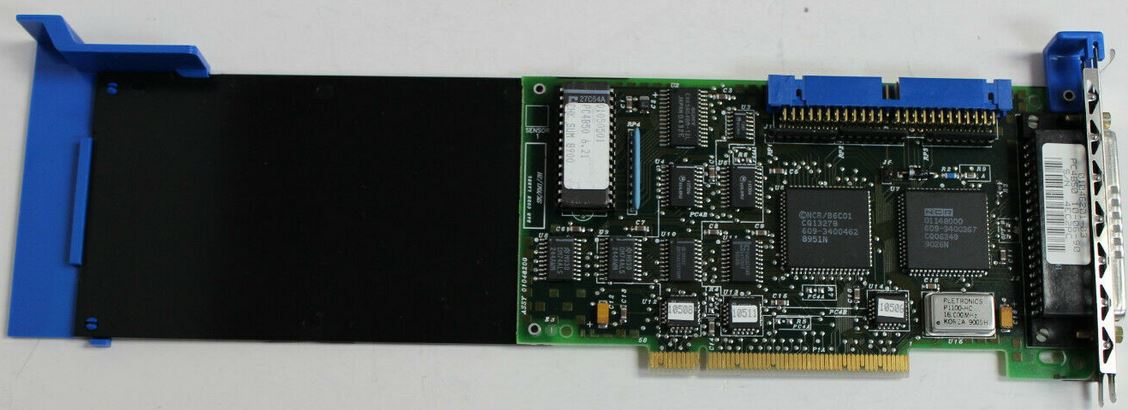 Same PCB, it has an extension riveted on to the PC4B PCB, perhaps to aid air flow? PC4B Interface Controller The PC4B supports the following Iomega drive subsystems: MultiDisk 150 [B150] Bernoulli 20, 44, 90, 230 Floptical 21: LaserSafe, LaserSafe PRO: The PC4 interface controller is an Iomega
proprietary controller, not a SCSI controller. The PC4B
will not support third party SCSI devices. The PC4B
interface kit includes the 37 to 50 pin SCSI cable, OAD
for DOS drivers, and Utility Users Manual. The PC4B
controller may also be use with the OS/2, Unix, and
Xenix operating systems. Addition drivers will be needed
for any operating system other than DOS. If your computer has a fixed disk drive,
the fixed disk drive should be used to boot your
computer. The ROM on the Iomega PC4B adapter should be
disabled. AdapterId 7FFA Iomega PC4B/50 SCSI Host Adapter Board I/O Address Select
DMA Level Select Fairness IRQ level Memory Address Select
PC4B/HD 05FCBh "Iomega PC4B/HD SCSI Host Adapter Board" NumBytes 4 FixedResources pos[0]=00XXXXXXb pos[1]=X11XXXXXb "I/O Address Select" "240", 340, 400, 420, 3240, 8240, A240, Disabled Set the adapter to any of the I/O Addresses. The first choice is recommended. 'Disabled' causes the adapter to be inaccessible. "DMA Level Select" The PC4 supports DMA mode of data transfer. Most O/Ss require this to be enabled. The lower the DMA level, the higher the priority. If you have a hard disk installed, it is recommended that you select a DMA level higher than the hard disk. "DMA Level 7", 6, 5, DMA Disabled "Fairness" "If 'Fairness' is enabled, the PC4 adapter will not compete for the channel during the next arbitration phase if it is currently in control of the channel. This allows other installed adapters to obtain the channel in the next sequence based on each adapter's assigned priority level. When 'Fairness' is disabled, the adapter will compete for every arbitration phase and will obtain more than its fair share of channel usage. We recommend you use 'Fairness Enabled' for all adapters. "Fairness Enabled", Fairness Disabled "IRQ level" Operation with multi-tasking operating systems may require an IRQ when the PC4 requires processor service. No other adapter may be assigned the same IRQ level as the PC4. For DOS-only systems, this option may be disabled. IRQ 3, 5, 7, 9, or Disabled. "Memory Address Select" The PC4 may use any of the Addresses listed. “Disabled” is recommended for systems with a fixed disk installed. If you want to boot from a device connected to your PC4, select the first available memory address and assign the device attached to the adapter the SCSI ID of zero. NOTE: Uses the clone 0,1 for boot devices ! NOTE: "Disabled"disables the BIOS ROM. Same as pulling the BIOS EPROM. "Disabled", DC00, D800, D400, D000, CC00, C800 "Termination Select" Sets termination ON or OFF. Default is ON. Turn termination OFF if you intend to use both the internal and external connectors. "ON", OFF IOMEGA Host Cable Pin-outs Original HERE on Internet Archive SIGNAL 50 PIN 50 PIN 37 PIN 25 PIN 50 PIN NAME Cntrncs Ribbon D-Shell D-Shell SCSI2/HD DB0 26 2 37 8 6 DBI 27 4 36 21 7 DB2 28 6 35 22 8 DB3 29 8 34 10 9 DB4 30 10 33 23 30 DB5 31 12 32 11 31 DB6 32 14 31 12 32 DB7 33 16 30 13 33 DBP(par) 34 18 29 20 34 ATN 41 32 n/c 17 41 BSY 43 36 8 6 43 ACK 44 38 7 5 44 RST/RES 45 40 6 4 45 MSG/MES 46 42 5 2 46 SEL 47 44 4 19 47 C/D 48 46 3 15 48 REQ 49 48 2 1 49 I/O 50 50 1 3 50 GND 1-11 * 11-28 7,9,14 1-12 GND 15-25, 20,22 10** 16,18, 14-25 GND 35,36, 30,34 24 35-37, GND 40,42, 39,40,42 RESERVED 12,14, 23,27 RESERVED 37,39 OPEN 13 25 9,10** 13 TRM PWR 38 26 n/c 25 38 NOTE: Cables with the same connectors on both ends are wired pin for pin. Cables with different connectors on its ends are wired according to the above chart. * All ODD pins except 23, 25, 27. ** Pin 10 is open on PC2 Adapters, but is tied to ground on the PCI, PC3, and PC4 adapters. NCR 86C01 Snippets
complete thread "An MCA ESP driver" HERE
Michael Necasek pulled this out while traveling... " OK, here's the goods I promised. The NCR 86C01
is an MCA interface chip that handles enabling/disabling
IRQ, DMA interfacing, I/O port selection and other fun
stuff. It takes up 16 addresses, and the chip it
is connected to gets the following 16. Registers
are as follows: |
